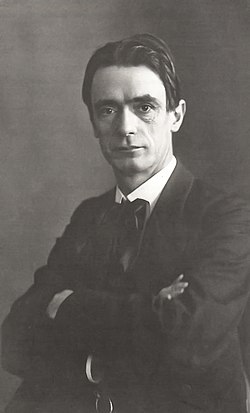Rudolf Steiner Quote
All things which have a directing force here in the physical world cease to exist when one arrives in the imaginative world. If, on the physical plane, you imagine yourself to have done something you actually have not done, you will soon be persuaded by the facts of the physical world that this is not so. This is not the case in astral space.
Rudolf Steiner
All things which have a directing force here in the physical world cease to exist when one arrives in the imaginative world. If, on the physical plane, you imagine yourself to have done something you actually have not done, you will soon be persuaded by the facts of the physical world that this is not so. This is not the case in astral space.
Related Quotes
About Rudolf Steiner
Rudolf Joseph Lorenz Steiner (German: [ˈʃtaɪnɐ]; 27 or 25 February 1861 – 30 March 1925) was an Austrian occultist, social reformer, architect, esotericist, and claimed clairvoyant. Steiner gained initial recognition at the end of the nineteenth century as a literary critic and published works including The Philosophy of Freedom. At the beginning of the twentieth century he founded an esoteric spiritual movement, anthroposophy, with roots in German idealist philosophy and theosophy. His teachings are influenced by Christian Gnosticism or neognosticism. Many of his ideas are pseudoscientific. He was also prone to pseudohistory.
In the first, more philosophically oriented phase of this movement, Steiner attempted to find a synthesis between science and spirituality. His philosophical work of these years, which he termed "spiritual science", sought to apply what he saw as the clarity of thinking characteristic of Western philosophy to spiritual questions,: 291 differentiating this approach from what he considered to be vaguer approaches to mysticism. In a second phase, beginning around 1907, he began working collaboratively in a variety of artistic media, including drama, dance and architecture, culminating in the building of the Goetheanum, a cultural centre to house all the arts. In the third phase of his work, beginning after World War I, Steiner worked on various ostensibly applied projects, including Waldorf education, biodynamic agriculture, and anthroposophical medicine.
Steiner advocated a form of ethical individualism, to which he later brought a more explicitly spiritual approach. He based his epistemology on Johann Wolfgang von Goethe's world view in which "thinking...is no more and no less an organ of perception than the eye or ear. Just as the eye perceives colours and the ear sounds, so thinking perceives ideas." A consistent thread that runs through his work is the goal of demonstrating that there are no limits to human knowledge.
In the first, more philosophically oriented phase of this movement, Steiner attempted to find a synthesis between science and spirituality. His philosophical work of these years, which he termed "spiritual science", sought to apply what he saw as the clarity of thinking characteristic of Western philosophy to spiritual questions,: 291 differentiating this approach from what he considered to be vaguer approaches to mysticism. In a second phase, beginning around 1907, he began working collaboratively in a variety of artistic media, including drama, dance and architecture, culminating in the building of the Goetheanum, a cultural centre to house all the arts. In the third phase of his work, beginning after World War I, Steiner worked on various ostensibly applied projects, including Waldorf education, biodynamic agriculture, and anthroposophical medicine.
Steiner advocated a form of ethical individualism, to which he later brought a more explicitly spiritual approach. He based his epistemology on Johann Wolfgang von Goethe's world view in which "thinking...is no more and no less an organ of perception than the eye or ear. Just as the eye perceives colours and the ear sounds, so thinking perceives ideas." A consistent thread that runs through his work is the goal of demonstrating that there are no limits to human knowledge.
